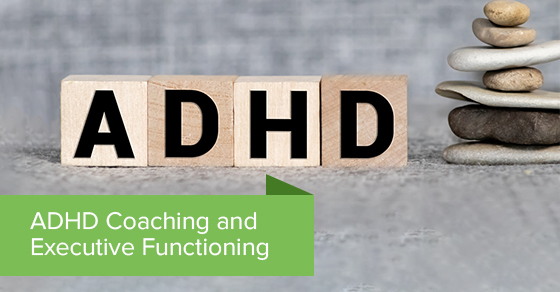Attention deficit hyperactivity disorder (ADHD) is a common neurodevelopmental disorder that affects millions of people globally. It is characterized by symptoms such as inattention, hyperactivity, and impulsivity, which can interfere with daily activities, especially in academic and professional settings. Individuals with ADHD often struggle with executive functioning.
What are the executive functions?
The executive functions are the set of high-level cognitive skills that help individuals self-monitor, plan, organize, initiate, adapt their thinking, regulate emotions, maintain focus, and complete tasks. They are processed in the part of your brain called the prefrontal cortex. Weak executive functioning can make it difficult for students to carry out assignments and responsibilities effectively, leading to a range of challenges that affect their academic performance, social relationships, and daily lives. Students who have executive functioning challenges experience a high level of distractibility and forgetfulness, have difficulty holding information in their working memory, have trouble demonstrating knowledge and ability in testing situations, and show an inability to sustain effort and regulate alertness.
A common challenge faced by students with executive functioning issues is difficulty with time management. These students may struggle to plan and prioritize their tasks, leading to missed deadlines, incomplete work, and poor academic performance. They may also have trouble estimating how long a task will take, leading to last-minute work and increased stress. Project initiation can also be difficult, and they may struggle to get started on tasks or projects, leading to procrastination and incomplete work. They may also need help breaking down tasks into smaller, more manageable steps, which can slow their progress on larger assignments.
In addition to time management and project initiation issues, students with weak executive functioning frequently lack organizational abilities. They may have problems keeping track of their assignments, notes, and materials, leading to lost or misplaced items. They may also have difficulty scheduling and prioritizing their work, leading to disorganization and confusion.
When it comes to social relationships, students with executive functioning deficits may struggle with social skills such as initiating conversations, reading social cues, and regulating their emotions. They may also have difficulty with self-control, leading to impulsive behavior and poor decision-making.
How ADHD coaching can help
These may seem like insurmountable obstacles but there are interventions that can make life easier for students with poor executive functioning, including ADHD coaching,
a collaborative and supportive process where a trained life coach helps clients develop strategies to manage their symptoms and improve their performance. The coach helps the client set goals, create action plans, and develop self-awareness to better manage their deficits. Effective coaches employ open-ended questions to elicit unique, individual patterns of responses and, through this process, engage students in self-regulatory behaviour to initiate change in their own lives.
Research indicates that ADHD coaching is highly effective in improving executive functioning skills and reducing symptoms of ADHD. A study published in the Journal of Attention Disorders found that ADHD coaching led to significant improvements in executive functioning skills, including time management, organization, and planning (Daley, et al., 2018). Another study published in the Journal of Clinical Child and Adolescent Psychology found that coaching was effective in reducing symptoms of ADHD in children (Langberg, et al., 2018), and found that those who received coaching showed significant improvements in academic performance and social skills compared to those who did not.
Coaching can help clients with ADHD identify time-wasting activities, prioritize tasks, and create a schedule to manage their time more effectively. By learning how to manage their time efficiently, individuals with ADHD can become more productive and successful in their academic and professional lives.
ADHD coaching also helps with project initiation and planning. People with ADHD often have difficulty starting tasks or projects, leading to unfinished assignments and missed deadlines. Coaches can show clients how to break down tasks into smaller, more manageable steps, schedule them appropriately, and create a plan of action to get started. This can lead to improved productivity and a sense of accomplishment.
Procrastination is another common challenge for people with ADHD. Coaching can help clients identify the reasons behind their procrastination—the brain’s way of coping with an anticipated unpleasant experience—and develop strategies to overcome it. By addressing the root causes of procrastination, individuals with ADHD can learn to manage their time better and reduce stress.
Self-awareness is an additional key benefit of ADHD coaching. Coaches help clients identify their strengths and weaknesses and develop strategies to manage their symptoms. By becoming more self-aware, individuals with ADHD can better understand their challenges and develop effective coping strategies.
Russell A. Barkley, a recognized expert in ADHD, notes that "coaching is the most effective approach we have for managing ADHD that is non-medical in nature" (Barkley, 2012). The psychologist Thomas E. Brown has also spoken about the importance of coaching, calling it “a powerful tool to help people with ADHD develop self-awareness and effective strategies for managing their symptoms" (Brown, 2013).
The benefits of ADHD coaching go beyond just improving executive functioning skills. Coaching can also help individuals with ADHD develop stronger self-esteem and a more positive appreciation for themselves and their abilities. By working with a coach who understands their struggles, people with ADHD can feel more empowered and motivated to reach their goals, leading to greater personal satisfaction and an improved quality of life.
Family and school psychologist and author Ken Shore writes that “a student's self-esteem has a significant impact on almost everything she does—on the way she engages in activities, deals with challenges, and interacts with others. Self-esteem also can have a marked effect on academic performance. Low self-esteem can lessen a student’s desire to learn, her ability to focus, and her willingness to take risks. Positive self-esteem, on the other hand, is one of the building blocks of school success; it provides a firm foundation for learning.”
At Evoke Learning, our coaches understand the biological underpinnings of ADHD, the core symptoms, and their comorbidity with executive dysfunction. ADHD/executive function coaching addresses the academic, emotional, and interpersonal difficulties resulting from these symptoms and helps students find ways to overcome them. Through individualized support, coaches help students concentrate on where they are now, where they want to be, and how to get there. Students can better realize their goals with a strong plan and regular check-ins to extend accountability.
Students who engage in coaching develop enhanced executive functioning and self-determination skills; engage in more positive thoughts and behaviours; take greater responsibility for their actions; use goal-attainment skills to manage stress more effectively; improve study skills and learning strategies; experience increased self-awareness, self-esteem, and satisfaction with school and work; and are more likely to persist in postsecondary education and have significantly better retention and graduation rates than those who did not receive coaching.
Learn a new set of skills this summer
Summer is a particularly good time to focus on ADHD coaching. There is no homework to juggle, and plenty of time to focus on strategies that will enhance executive functioning skills, promote more positive thoughts and behaviours, and discover new approaches to learning.
Students can:
-
Build skills for the upcoming school year,
-
Prepare for transitions,
-
Learn evidence-based learning strategies,
-
Strengthen their organization, time management, and executive function skills to enhance academic performance,
-
Learn strategies they can use to help facilitate change, and
-
Help translate abstract goals into concrete actions.
Coaching gives students an opportunity to understand their ADHD better: how their symptoms play out in their daily, personal, and academic lives and how ADHD gets in the way of their learning.
If you or someone you know has been diagnosed with ADHD or executive functioning deficits and would like to make a change, contact us to learn more about our coaching services and how personalized guidance and a supportive learning environment can lead to growth and success.


